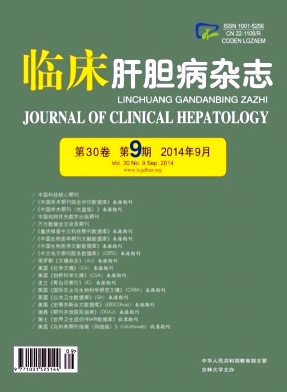|
[1] EL-SERAG HB, RUDOLPH KL.Hepatocellular carcinoma:Epidemiology and molecular carcinogenesis[J].Gastroenterology, 2007, 132 (7) :2557-2576.
|
|
[2]World Health Organization Mortality Database.WHO Statistical Information System[EB/OL].[2014-01-07].http://www.who.int/whosis/en/.
|
|
[3]KASSAHUN WT, FANGMANN J, HARMS J, et al.Liver resection and transplantation in the management of hepatocellular carcinoma:a review[J].Exp Clin Transplant, 2006, 4 (2) :549-558.
|
|
[4] ARRELL DK, NEVEROVA I, van EYK JE.Cardiovascular proteomics:evolution and potential[J].Circ Res, 2001, 88 (8) :763-773.
|
|
[5] WIERZBA K, MUROI M, OSADA H.Proteomics accelerating the identification of the target molecule of bioactive small molecules[J].Curr Opin Chem Biol, 2011, 15 (1) :57-65.
|
|
[6]RIFAI N, GILLETTE MA, CART SA.Protein biomarker discovery and validation:the long and uncertain path to clinical utility[J].Nat Biotechnol, 2006, 24 (8) :971-983.
|
|
[7]KANG XN, SUN L, GUO K, et al.Serum protein biomarkers screening in HCC patients with liver cirrhosis by ICAT-LC-MS/MS[J].J Cancer Res Clin Oncol, 2010, 136 (8) :1151-1159.
|
|
[8]JIN GZ, DONG H, YU WL, et al.A novel panel of biomarkers in distinction of small well-differentiated HCC from dysplastic nodules and outcome values[J].BMC Cancer, 2013, 13:161.
|
|
[9]TSAI ST, TSOU CC, MAO WY, et al.Label-free quantitative proteomics of CD133-positive liver cancer stem cells[J].Proteome Sci, 2012, 10 (1) :69.
|
|
[10] YEO M, NA YM, KIM DK, et al.The loss of phenol sulfotransferase-1 in hepatocellular carcinogenesis[J].Proteomics, 2010, 10 (2) :266-276.
|
|
[11]SUN S, POON RT, LEE NP, et al.Proteomics of hepatocellular carcinoma:serum vimentin as a surrogate marker for small tumors (≤2 cm) [J].J Proteome Res, 2010, 9 (4) :1923-1930.
|
|
[12]LI N, LONG Y, FAN X, et al.Proteomic analysis of differentially expressed proteins in hepatitis B virus-related hepatocellular carcinoma tissues[J].J Exp Clin Cancer Res, 2009, 28:122.
|
|
[13]KANMURA S, UTO H, SATO Y, et al.The complement component C3a fragment is a potential biomarker for hepatitis C virus-related hepatocellular carcinoma[J].J Gastroenterol, 2010, 45 (4) :459-467.
|
|
[14]WANG X, CHEN Y, HAN QB, et al.Proteomic identification of molecular targets of gambogic acid:role of stathmin in hepatocellular carcinoma[J].Proteomics, 2009, 9 (2) :242-253.
|
|
[15]GOU L, WANG W, TONG A, et al.Proteomic identification of RhoA as a potential biomarker for proliferation and metastasis in hepatocellular carcinoma[J].J Mol Med (Berl) , 2011, 89 (8) :817-827.
|
|
[16]REN F, WU H, LEI Y, et al.Quantitative proteomics identification of phosphoglycerate mutase 1 as a novel therapeutic target in hepatocellular carcinoma[J].Mol Cancer, 2010, 9:81.
|
|
[17]HU MY, LAM CT, LIU KD.Proteomic identification of a monoclonal antibody recognizing caveolin-l in hepatocellular carcinoma with metastatic potential[J].Protein Pept Lett, 2009, 16 (5) :479-485.
|
|
[18]LIU H, FU X, JI W, et al.Human sulfatase-1 inhibits the migration and proliferation of SMMC-7721 hepatocellular carcinoma cells by downregulating the growth factor signaling[J].Hepatol Res, 2013, 43 (5) :516-525.
|
|
[19]WU L, PENG CW, HOU JX, et al.Coronin-1C is a novel biomarker for hepatocellular carcinoma invasive progression identified by proteomics analysis and clinical validation[J].J Exp Clin Cancer Res, 2010, 29:17.
|
|
[20]LI Y, WUJ, ZHANGW, et al.Identificationof serumCCL15inhepatocellular carcinoma[J].Br J Cancer, 2013, 108 (1) :99-106.
|
|
[21]ZHAO P, ZHANG W, WANG SJ, et al.HAb18G/CD147 promotes cell motility by regulating annexin ii-activated RhoA and Rac1 signaling pathways in hepatocellular carcinoma cells[J].Hepatology, 2011, 54 (6) :2012-2024.
|
|
[22]YOKOO H, KONDO T, OKANO T, et al.Protein expression associated with early intrahepatic recurrence of hepatoeellular carcinoma after curative surgery[J].Cancer Sci, 2007, 98 (5) :665-673.引证本文:WANG JG, FEI XY, SONG Q.Application of proteomics in study of hepatocellular carcinoma[J].J Clin Hepatol, 2014, 30 (9) :958-960. (in Chinese) 王建钢, 费新应, 宋青.蛋白质组学研究技术在肝细胞癌诊疗中的应用[J].临床肝胆病杂志, 2014, 30 (9) :958-960.
|







 DownLoad:
DownLoad: